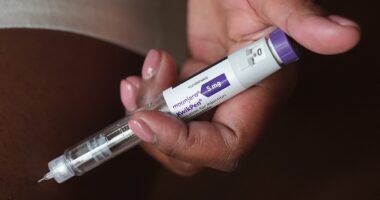Share this @internewscast.com
Health Secretary Robert F Kennedy Jr is getting ready to publish a report that suggests a connection between a widely used over-the-counter painkiller during pregnancy and autism.
In an April cabinet meeting, Kennedy stated that by September, the cause of the autism epidemic would be identified. The upcoming report will contend that one potential cause is the use of the popular pain reliever Tylenol (acetaminophen) during pregnancy.
The report will also introduce an innovative idea: a medicine derived from folate might be used to alleviate symptoms of the developmental disorder in certain cases, according to those familiar with the subject.
Autism spectrum disorder affects one in every 31 children in the US, presenting a range of symptoms from mild to moderate social, speech, and motor difficulties to severe self-harming behaviors or complete speech loss.
Individuals familiar with the situation suggest that the upcoming health department report is adopting a careful and balanced approach. It is set to examine various possible causes of the disorder and differentiate between what is scientifically established and what remains unknown in autism research.
The National Institutes of Health is overseeing the drafting process, and the report, primarily expected to consolidate existing research, is planned for public release later this month, as exclusively reported by the Wall Street Journal.
Tylenol contains the active ingredient acetaminophen, which an estimated 50 million Americans use for aches and pains each week.
The medication is widely considered to be safe for pregnant women to take. However, professional organizations like the American College of Obstetrics and Gynecology recommend that women discuss using the medication with their doctors first.

A forthcoming report, prompted by RFK Jr., is expected to claim that Tylenol use during pregnancy is a cause of what he calls the ‘autism epidemic’ (stock)
People close to the matter have said that NIH director Dr. Jay Bhattacharya, Food and Drug Administration Commissioner Dr. Marty Makary and Centers for Medicare and Medicaid Services Director Dr. Mehmet Oz are helping shape the autism report.
In addition to linking autism with Tylenol use in pregnancy, the report is expected to suggest that low levels during pregnancy of folate, a B vitamin crucial during pregnancy for preventing birth defects of the brain and spinal cord, could be among the leading causes of the disorder.
HHS will zero in on a form of folate called folinic acid, or leucovorin, as a way to decrease the core symptoms of autism.
Leucovorin is commonly used to reduce the potential side effects of a cancer medicine called methotrexate at high doses. It is turned into folic acid in the body that protects healthy cells from the effects of high-dose methotrexate, which can cause extensive damage ot the liver, kidneys and lungs.
Low folic acid during pregnancy can hinder the development of the fetus’ brain and spinal chord in the first trimester, resulting in spina bifida, a birth defect where the spinal cord does not close completely during fetal development leading to paralysis, fluid buildup in the brain and learning disabilities, or anencephaly, in which a baby is born without major portions of the brain and skull.
Folic acid deficiency has been considered in the past to be a catalyst for autism. A 2021 review of 56 studies investigated a potential link and identified multiple studies that found a link between low folic acid and an increased risk of autism spectrum disorders.
Several large human cohort studies found that maternal folic acid supplementation before and during pregnancy was associated with a significantly reduced risk of ASD in their children, with risk reductions ranging from approximately 30 percent to over 50 percent.
Multiple case-control studies consistently reported that children diagnosed with ASD had significantly lower folate levels in their blood compared to typically developing children.

While widely considered safe during pregnancy, medical guidelines advise consulting a doctor before taking Tylenol
Some studies also found that a common alteration in DNA, which reduces the body’s ability to process folate efficiently, was associated with a higher risk of ASD.
Evidence to back up a potential link between autism and Tylenol is sparse and conflicting.
The current emphasis on the generally innocuous pain reliever stems from a sweeping review of studies into prenatal acetaminophen use published last month.
Of the 46 studies into an association between prenatal use and an increased incidence of brain development disorders, including autism, eight addressed autism specifically. Five of the studies reported a strong link, while two found no link, and one reported inconclusive results.
However, the authors of the review, published in the journal Environmental Health, did not conclude that pregnant women should altogether avoid Tylenol, but rather that it should be used judiciously.
They said: ‘While this association warrants caution, untreated maternal fever and pain pose risks such as neural tube defects and preterm birth, necessitating a balanced approach.
‘We recommend judicious acetaminophen use—lowest effective dose, shortest duration—under medical guidance, tailored to individual risk–benefit assessments, rather than a broad limitation.’
For ethical reasons, researchers cannot perform randomized controlled trials on pregnant women to establish if a drug causes fetal harm definitively.
Kenvue, the parent company of Tylenol’s manufacturer, said in a statement: ‘Nothing is more important to us than the health and safety of the people who use our products.
‘We have continuously evaluated the science and continue to believe there is no causal link between acetaminophen use during pregnancy and autism.’
The increase in autism diagnosis rates, which climbed 175 percent from 2011 to 2022, has been attributed to more widespread acceptance of neurodivergent people, improved measures doctors can use to screen their young patients and greater awareness of signs parents should watch for.
The most significant rise during that period was observed in young adults aged 26 to 34, whose rates increased by 450 percent.
Children between the ages of five and eight continue to have the highest diagnosis rate, at 30 per 1,000.

RFK Jr controversially labels autism an ‘epidemic,’ a stance widely rejected by scientists and advocates, who state that autism is a complex disability shaped by genetic and environmental factors, not a contagious disease
RFK Jr has previously opposed scientific evidence that points to autism being 80 percent to 90 percent determined by genetics, instead, channeling focus toward finding out possible environmental causes, from over-the-counter and prescription drugs to pesticides and preservatives in food.
‘This is a preventable disease,’ he said on April 16. ‘We know it’s an environmental exposure. It has to be. Genes do not cause epidemics. They can provide a vulnerability, but you need an environmental toxin.’
RFK and the Make America Healthy Again movement have labeled autism spectrum disorder an epidemic, a highly controversial take that has been rejected by the vast majority of scientists, parents of autistic children and advocates for people with autism.
The nonprofit Autism Society said in response to RFK’s rhetoric: ‘Autism is a complex developmental disability shaped by genetic, biological, and environmental factors.
‘It is neither a chronic illness nor a contagion, that qualifies harmful language like “epidemic,” and to do so is both inaccurate and stigmatizing.’















